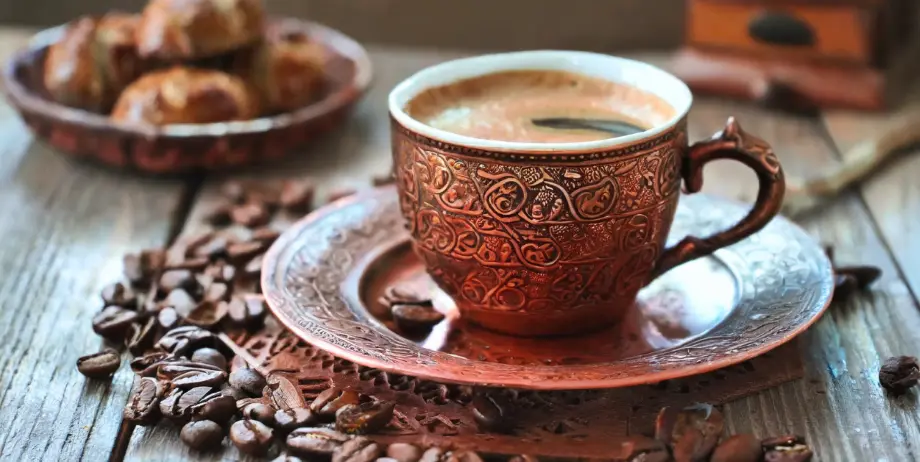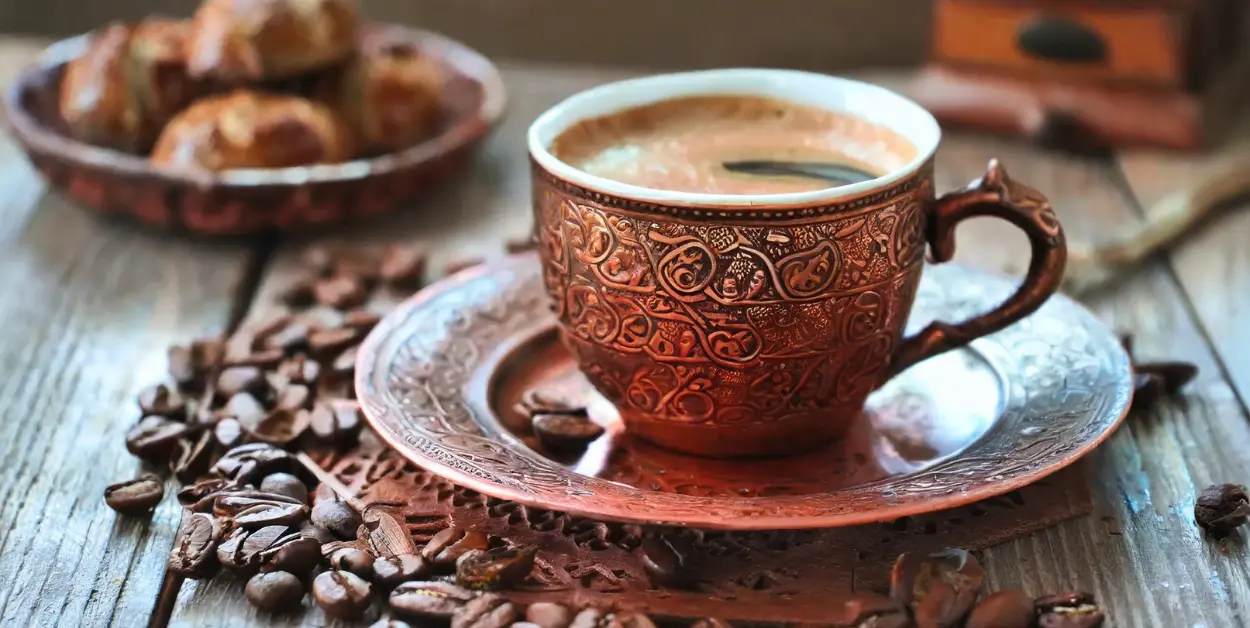Bosnian coffee represents more than just a caffeine boost – it’s a cherished tradition deeply embedded in Balkan culture.
Known for its rich, robust flavor and distinctive preparation method, Bosnian coffee (also called Bosanska kafa) shares similarities with Turkish coffee but maintains its unique identity through specific brewing techniques and serving customs.
In Bosnia and Herzegovina, coffee ceremonies facilitate conversation, hospitality, and community connection. Whether you’re a coffee enthusiast eager to explore global brewing methods or someone with Bosnian heritage wanting to reconnect with tradition, this recipe will guide you through creating an authentic cup of Bosnian coffee in your own home.
Key Information
- Prep Time: 5 minutes
- Cook Time: 10 minutes
- Total Time: 15 minutes
- Servings: 2 people
- Difficulty Level: Moderate
What Is Bosnian Coffee?

Bosnian coffee, also known as Turkish coffee, is a traditional style of coffee that originated in the Ottoman Empire and has been embraced by Bosnia and Herzegovina for centuries.
This rich and strong brew is made with finely ground coffee, water, and sugar, and is typically served in small copper pots called ibriks or džezzas. The unique preparation process involves boiling the coffee over an open flame, allowing the drinker to control the amount of sugar they add to their liking.
In Bosnia and Herzegovina, Bosnian coffee is an integral part of social gatherings and everyday life. It’s common to see people enjoying coffee and conversation in cafes, homes, and outdoor spaces.
When serving Bosnian coffee, it’s customary to offer a pile of sugar cubes alongside the ibrik, allowing each person to sweeten their coffee according to their preference. Some people also enjoy Turkish delights, small jelly candies, on the side.
With a history dating back to the 15th century, Bosnian coffee has survived the test of time and remains a beloved tradition in Bosnia and Herzegovina. Its similarity to Arabic and Turkish coffee highlights the shared cultural heritage of these regions.
While the Ottoman Empire may have fallen, the love for Bosnian coffee continues to thrive, symbolizing hospitality, community, and tradition. Whether you’re visiting Bosnia and Herzegovina or simply seeking a new coffee experience, trying Bosnian coffee is a must.
Other Recipes
- Fudgy Protein Brownies That Taste Like Dessert but Fuel Your Goals
- How to Make Protein Iced Coffee That Boosts Energy and Builds Muscle
- Authentic Vietnamese Iced Coffee: Strong, Sweet, and Refreshing
- The Best Decaf Iced Coffee Recipes for a Chill Caffeine-Free Sip
- Easy Caramel Iced Coffee Recipe You Can Make at Home
- Homemade Toffee Nut Latte That Tastes Better Than the Coffee Shop
- How to Make Traditional Turkish Coffee Without Cezve: A Rich and Cultural Brew
Bosnian Coffee Recipe

Ingredients and Equipment For One Person
- A Bosnian džezva pot
- Stovetop or open flame
- 2 Tablespoon of Coffee grinds
- Sugar Cubes (taste according)
- Optional: milk, rahat lokum (Bosnian Turkish delight), a glass of water
How To Make Bosnian Coffee?
- Bring the water to a boil in the džezva over medium heat.
- Add the coffee grounds on top of the boiling water, stirring gently to combine.
- Allow the coffee to simmer in the boiling water for a few minutes, keeping a close eye on it to prevent it from overflowing.
- Prepare your mug by placing a sugar cube or two in the bottom.
- Carefully pour the coffee into the mug, waiting for the sugar to dissolve before adding the rest of the coffee.
- Avoid pouring the grounds into the mug, as this is considered impolite.
- Serve the coffee with a glass of water and optional milk.
Check also – Top Coffee Makers of the Year: Brew the Perfect Cup at Home
Tips for Perfect Bosnian Coffee
- Never use boiling water to start the process. Always begin with cold water for proper development of flavor.
- The coffee grind must be extremely fine – closer to powder than to typical ground coffee.
- Patience is key. Rush any part of the process and you’ll sacrifice the quality of both flavor and foam.
- Don’t stir the coffee during heating. This disrupts the natural separation that creates the prized foam.
- When drinking, sip slowly and avoid reaching the bottom of the cup where the grounds have settled.
- If you don’t have a traditional džezva, a small saucepan with a narrow opening will work in a pinch, though the foam may not develop as effectively.
- The water should be unfiltered if possible, as the mineral content contributes to the flavor profile.
Common Mistakes to Avoid
- Using coffee that isn’t ground fine enough, results in grounds that don’t properly settle.
- Stirring the coffee during the heating process prevents proper foam formation.
- Allowing the coffee to fully boil, creates a bitter taste and destroys the foam.
- Drinking the grounds at the bottom of the cup – these are meant to remain untouched.
- Rushing the preparation or consumption, goes against the cultural spirit of Bosnian coffee.
Is Bosnian Coffee Strong?
Yes, Bosnian coffee is known for being strong and rich in flavor. It is typically made with finely ground coffee beans that are slowly brewed in a traditional džezva, which allows the coffee to extract a concentrated and intense flavor. The resulting coffee is usually quite dark and has a thick, creamy texture, which makes it feel almost velvety on the tongue.
Bosnian coffee is often served in small cups, which allows the drinker to fully appreciate the intensity of the flavor without feeling overwhelmed. The coffee is usually consumed slowly and carefully, as it is considered a luxury and a pleasure to be savored.
How To Serve Bosnian Coffee?
Bosnian coffee is typically served in a traditional džezva, which is a small, copper or brass pot with a narrow spout. The coffee is poured into tiny cups called “fincan” or “čajna čaša”, which are designed to hold only a small amount of liquid.
What Is The Difference Between Bosnian and Turkish Coffee?
Bosnian coffee and Turkish coffee are both popular styles of coffee that originated in the Balkans and Middle East, respectively. While they share some similarities, there are also some key differences between the two.
- Roast level: Bosnian coffee is typically made with a darker roast than Turkish coffee. Bosnian coffee is often roasted to a French or Italian roast level, while Turkish coffee is usually roasted to a medium or light roast level.
- Grind size: Bosnian coffee is ground to a finer consistency than Turkish coffee. Bosnian coffee is typically ground to a powder, while Turkish coffee is ground to a slightly coarse consistency.
- Brewing method: Bosnian coffee is brewed using a džezva, which is a small, copper or brass pot with a narrow spout. Turkish coffee, on the other hand, is brewed using a cezve, which is a larger, copper or brass pot with a wide spout.
- Water temperature: Bosnian coffee is brewed with hot water, while Turkish coffee is brewed with cold water.
- Sugar content: Bosnian coffee is typically served unsweetened, while Turkish coffee is often served with sugar.
- Texture: Bosnian coffee has a thicker, more velvety texture than Turkish coffee due to the finer grind size and darker roast level.
- Flavor profile: Bosnian coffee has a richer, more intense flavor profile than Turkish coffee, with notes of chocolate and caramel. Turkish coffee, on the other hand, has a brighter, more acidic flavor profile with notes of fruit and nuts.
Find out How can you make coffee without filter
Recommended By BeautifulKitchenguide's Team
Little Lunches - Personalized Meal Planning - 7 Day Free Trial
Amazon Must Have Kitchen Gadgets To Save Time Check List
Best Kitchen Faucets of 2025: Sleek, Durable & Worth Every PennyCheck Our Review
The Ultimate Guide to the Best Coffee Makers for Every Budget Check Our Review

